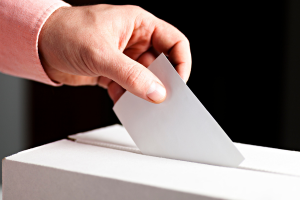
By Michael Bilfinger, AACRAO Assistant Director of Public Policy
Democracy is a system of government in which the state draws its power and legitimacy from the consent of its citizens. There are many different variations of democracy, and the U.S. employs a representative democracy in which citizens elect officials to make decisions on their behalf as opposed to directly voting on issues, as some states do in referendum votes. While not technically part of the definition of democracy, certain institutions, such as the freedom of speech and press, are critical to a democracy's function because they directly support the citizen's ability to consent to the state's rule. For a democracy to be healthy and just, all members of society, both those in the majority and in the minority, must buy into this idea of citizenry consent and uphold these virtues.
The Landscape
Voting in a democracy is critical because it is the most direct avenue that citizens can use to express consent, the basis for their government's legitimacy, and influence laws and priorities. In the 2020 presidential election, 66 percent of eligible voters cast a ballot, according to the Pew Research Center. This was the highest U.S. voter turnout rate in a national election since 1900, and yet it still pales in comparison to the turnout rate in many other developed democracies.
Additionally, voter registration and turnout in the U.S. is not equal across all populations. For example, the estimated voter registration rate for Asian Americans is about 9 percent lower than it is for whites, and for Latinos, the gap is roughly 13 percent, according to National Public Radio. The impacts of this can be seen on election day. For instance, 43 percent of eligible white adults voted in the 2018, 2020, and 2022 elections, whereas only 21 percent of eligible Asian Americans voted in all three and only 19 percent of eligible Latinos, according to the Pew Research Center. Furthermore, current evidence from the Brennan Center of Justice suggests that these disparities in voter turnout have been consistently widening since 2012 after having been on a downward decline since the civil rights revolution of the 1960s. All the while, polling by Gallup in June 2024 found that only 28% of Americans are satisfied with the way democracy functions, a historic low.
The Impact
But why care? With voter registration trends seemingly worsening and a general feeling amongst the public that voting doesn't actually lead to change, why bother voting? Simply put, because of the enormous impact the federal government can have on your daily life. For example, in FY 2024, the U.S. Department of Education (the Department) has thus far spent over $160 billion dollars, more than half of which $85.2 billion, went to federal direct student loan programs (source). This money ultimately went to higher education institutions, many of whom wouldn't exist without this funding lifeline. Additionally, as of January 2024, the Department holds $1.5 trillion in federal loans for nearly 43 million borrowers, according to the Government Accountability Office. For comparison, the largest banks in America, J.P. Morgan, and Chase had roughly $1.3 trillion in net loans on their balance sheet for 2023 (source).
Beyond money, the Department is also responsible for many of the regulations that govern the daily functioning of campuses. From Title IX dictating how schools respond to sexual assault to FERPA's influence on anywhere there is an educational record to the upcoming Financial Value Transparency (FVT) and Gainful Employment (GE) reporting requirements, the Department helps shape higher education, and by voting, you can help to shape the Department. Check out
AACRAO's voter registration page to learn more about institutional obligations regarding student voting. Make sure you
know your state's election deadlines and that you are registered to vote.